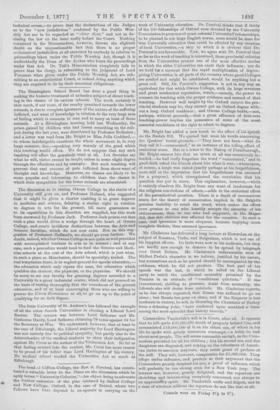Mr. Bright has added a new touch to the effect
of kis speech on the Burials Bill. We quoted last week his words concerning the Quakers' burial-grounds,—" They have not been—what do they call it 7—consecrated," as an instance of the telling effect of oratorical scorn. But in a letter to the Bishop of Peterborough, Mr. Bright assures him that no scorn at all was consciously in- tended,—he had really forgotten the word "consecrated," and in good-faith asked the fricyde about him what it was,—whereupon, of course, a laugh was raised (partly perhaps at his forgetfulness, more still at the impression that his forgetfulness was assumed for a purpose), which strengthened the conviction that his question was put in scorn. This explanation, however,—while it entirely absolves Mr. Bright from any want of tenderness for the religious convictions of others,—adds to the oratorical effect of the parenthetical question. There is a depth of unconscious scorn for the theory of consecration implied in Mr. Bright's genuine inability to recall the word, which makes the effect even greater to one who heartily accepts the sincerity of his obliviousness, than to one who had supposed, as Dr. Magee did, that this oblivion was affected for the occasion. In such a case, real ignorance is more eloquent, because implying more complete disdain, than assumed ignorance.






































 Previous page
Previous page